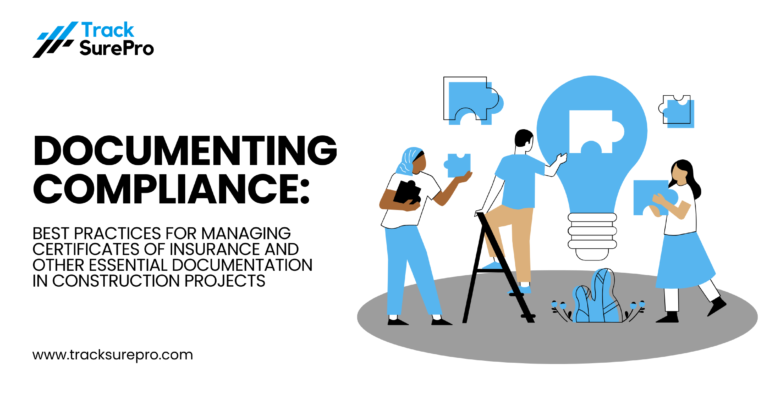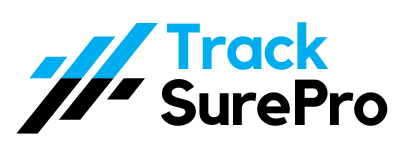Documenting Compliance: Best Practices for Managing Certificates of Insurance and Other Essential Documentation in Construction Projects

Documenting Compliance: Best Practices for Managing Certificates of Insurance and Other Essential Documentation in Construction Projects
Introduction:
In the construction industry, documentation plays a crucial role in ensuring regulatory compliance, risk management, and project success. Certificates of insurance (COIs) and other essential documents are critical for verifying compliance with insurance requirements, licensing regulations, and contractual obligations. However, managing and organizing these documents can be challenging for construction firms. In this comprehensive guide, we will explore the importance of documenting compliance, highlight best practices for managing certificates of insurance and other essential documentation, and present solutions leveraging compliance software solutions like TrackSurePro to streamline document management processes effectively.
Importance of Documenting Compliance:
- Risk Mitigation:
- Documenting compliance with insurance requirements, safety regulations, and contractual obligations is essential for mitigating risks associated with legal liabilities, project delays, and financial losses. Accurate and up-to-date documentation provides evidence of compliance and protects construction firms from potential disputes and claims.
- Regulatory Compliance:
- Construction projects are subject to various regulatory requirements, including insurance coverage, licensing, and environmental regulations. Documenting compliance with these regulations ensures that construction firms operate within legal boundaries and avoid regulatory penalties and fines.
- Contractual Obligations:
- Contracts and agreements with clients, subcontractors, and vendors often include specific documentation requirements, such as COIs, licenses, and permits. Documenting compliance with contractual obligations helps construction firms fulfill their commitments and maintain positive relationships with stakeholders.
Best Practices for Managing Documentation:
- Centralized Document Repository:
- Establish a centralized document repository to store and organize certificates of insurance, permits, licenses, contracts, and other essential documentation. A centralized system allows easy access to documents, reduces redundancy, and ensures consistency across projects.
- Document Tracking and Monitoring:
- Implement a document tracking and monitoring system to track the expiration dates, renewal dates, and compliance status of certificates of insurance and other critical documents. Automated reminders and notifications help ensure timely renewal and compliance.
- Standardized Documentation Processes:
- Develop standardized documentation processes and procedures to ensure consistency and accuracy in document management. Clearly define roles and responsibilities for document collection, verification, and storage to minimize errors and discrepancies.
- Regular Audits and Reviews:
- Conduct regular audits and reviews of documentation to verify compliance with regulatory requirements, contractual obligations, and internal policies. Audits help identify gaps in documentation, address non-compliance issues, and improve overall document management practices.
Solutions with Compliance Software Solutions:
- TrackSurePro Software:
- TrackSurePro is a comprehensive compliance software solution designed to streamline document management processes for construction firms. With features such as centralized document storage, automated reminders, and compliance tracking, TrackSurePro simplifies document management and reduces administrative burden.
- Centralized Document Repository:
- TrackSurePro provides a centralized document repository for storing, organizing, and accessing certificates of insurance, permits, licenses, and other critical documents. Contractors can easily retrieve documents, track expiration dates, and monitor compliance status from a single platform.
- Automated Reminders:
- TrackSurePro sends automated reminders for document renewal deadlines, ensuring construction firms stay informed and proactive in maintaining compliance. Contractors can set up customizable reminders for COIs, permits, licenses, and other essential documents.
- Compliance Tracking:
- TrackSurePro tracks compliance with regulatory requirements, contractual obligations, and internal policies across projects and stakeholders. Contractors can monitor document status, identify non-compliance issues, and take timely corrective actions to mitigate risks.
Conclusion:
In conclusion, documenting compliance with certificates of insurance and other essential documentation is crucial for construction firms to mitigate risks, ensure regulatory compliance, and achieve project success. By implementing best practices for managing documentation and leveraging compliance software solutions like TrackSurePro, construction firms can streamline document management processes, reduce administrative burden, and enhance compliance efficiency. With TrackSurePro’s advanced features, including centralized document storage, automated reminders, and compliance tracking, contractors can navigate the complexities of document management with confidence, ensuring legal compliance and project success. Embracing technology-driven solutions is key to staying compliant, competitive, and successful in today’s construction industry landscape.

